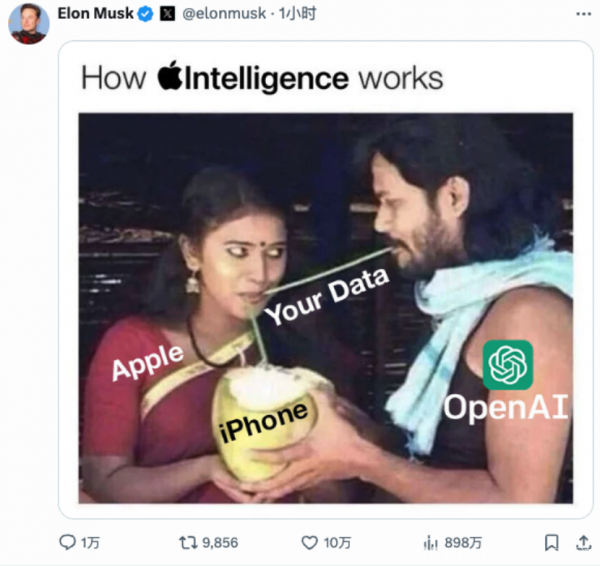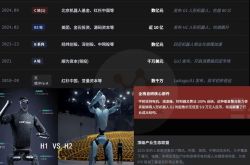A 7% Surge in Stock Price: Apple May Not Have Been Seeking an AI Race
![]() 06/13 2024
06/13 2024
![]() 565
565
Introduction
It's here, it's really here.
On June 11, Apple held WWDC 2024, dedicating 40 minutes of the 90-minute keynote to AI.
For a long time before, Tim Cook had been using ML instead of AI, but now he directly swapped it out, using "Apple Intelligence" to refer to AI instead of the universally recognized "Artificial Intelligence," aiming to预示Apple would redefine an AI era.
The marketing was explosive, but the effect is intriguing.
Wall Street initially took a cautious approach, initially causing Apple's stock price to drop by nearly 2%.
Then, by Tuesday's close, Apple's stock price had risen by 7.26%, closing at $207.15.
The stock price hit an all-time high, with the market capitalization increasing by $214.2 billion overnight, reaching $3.176 trillion, setting a new all-time high for the consumer electronics giant this year.
This is because after a day of digestion, investors and the public found that Apple's newly released Apple Intelligence was not bad, at least starting from the system level rather than a superficial approach at the application level.
Although Wall Street analysts have been expressing concerns about Apple's "quietly making a fortune" strategy in the field of artificial intelligence for more than a year. It is clear that Apple has indeed been building up momentum.
So, how did this showdown go?
01 Good Features, But Not Explosive
If we were to grade Apple's AI features, it could be roughly divided into: T1 Wow, T2 Good, T3 Basic.
As for why there's no T0, well... do you really need to ask?
T1 Wow - New Siri, New Brain & New Eyes & New Skin
Siri is not going away, but is reborn!
According to Apple's official data, Siri receives up to 1.5 billion requests per day, meaning that on average, everyone speaks to Siri a couple of times a day. Note that this is under the premise that everyone is complaining about it.
The reason why the old Siri was useless is that it was "dumb" - it would only play the game of "you ask, I guess" within a keyword library, throwing you a webpage when it couldn't understand, but you didn't want to click on it at all.
The reason why the new Siri is powerful is because it has grown a "new brain" and "new eyes".
The new Siri can "understand" screen interfaces, comprehend your questions, remember the content you mentioned, understand context, and handle complex problems.
Wait, isn't this the paper Apple released in April this year?
The paper mentions a multimodal model called Ferret-UI that can "understand" mobile phone screens and translate natural language into interface operation points to perform various tasks. After testing, Ferret-UI outperformed GPT-4V (OpenAI) in all basic UI tasks and surpassed Fuyu (Adept) and CogAgent (Wisdom AI) in advanced UI tasks.
Although it's not clear if the new Siri benefits from Ferret-UI, it has indeed become more intelligent and perceptive.
When you want to find a picture of your ID card, you don't need to sift through your album one by one. The new Siri can quickly help you find it and thoughtfully add it to your notes;
When you want to share a photo of your kitten during its "baby" period, the new Siri can not only find it on its own but also edit it with one click and theoretically send it to a specified friend;
When your leader sends you an online meeting address, the new Siri can open the app on its own, help you book the meeting, and remind you to join before the meeting starts;
When you want to access recent private information, the new Siri can automatically search emails, text messages, pictures, and integrate them to provide an answer, and it can prioritize based on importance.
Oh, right! The new Siri also has a new skin, and it's finally not just a bubble anymore! Moreover, it finally supports text input, which is a blessing for introverts.
According to WWDC's "demo," Siri (high-IQ version) has been realized and seamlessly shuttles between various apps like a true AI Agent.
However, the most complete "real-world experience" may still take some time, and whether there is any lag or whether it is smart enough remains to be seen. Therefore, we rate the new Siri as T1, narrowly missing T0.
T2 Good - "Shell" ChatGPT & Privacy Security
If you ask Siri a question beyond its knowledge range, will it still throw you a webpage link?
Now it won't, because there's the "most powerful brain" ChatGPT to help.
Although every phone can use ChatGPT through apps, Apple's collaboration with OpenAI integrates more "ChatGPT capabilities" into the iPhone and equips Siri with an "external brain".
For example, Siri can call upon GPT-4o at any time. When you want to "eat melon" (gossip), Siri can summarize today's small, big, and astonishing melons based on your daily gossip "domain," and even draw out a complete timeline of melon-eating, not missing a single melon on the vine.
Another example is that ChatGPT is built into writing tools. When you're insomniac, Siri can use GPT-4o to create a bedtime story and tell it to you with a captivating voice, giving you a real Samantha.
The most crucial thing is that GPT-4o is free, you don't need to create an account, and user data will not be recorded.
In fact, earlier, Apple also negotiated with Google, its "old rival," to use Gemini. Although there was no collaboration this time, it is expected that the large model vendors that will "stick close" to Apple will not only be OpenAI.
In terms of privacy protection, Musk used this image to criticize Apple and said, "If Apple integrates OpenAI into its system, then Apple devices will be banned in my company."

In reality, Apple seems quite reliable in terms of privacy protection.
When encountering problems, first see if they can be solved using on-device large models.
In this aspect, Apple only collects information within the device without transmitting it to the cloud, and most AI functions can be completed.
On the one hand, this is because Apple's self-developed chips are powerful enough, and on the other hand, it is also related to Apple's "secret strategy".
At the end of last year, Apple quietly released a "game-changing" paper.
It mentions that Apple has successfully deployed LLM on iPhone and other Apple devices with limited memory through Flash-LLM technology. Data shows that the devices can support running model sizes that are twice their own DRAM (processor); the reasoning speed of LLM is improved by 4-5 times on the Apple M1 Max CPU and 20-25 times on the GPU. This achievement directly breaks through the "memory wall" of mobile phones, realizing the integration of large models into the iPhone.
If the user's question is too "tricky" and must be solved in the cloud, then ChatGPT will not store information without your consent.
To prevent Ultraman from being unethical, Apple has specifically added a "password lock," developing a private cloud (Private Cloud Compute) for cloud-based large models and adopting the iPhone's privacy policy to ensure that hardware, software, and even programming languages are sufficiently secure.
Craig Fedrighi, Apple's Senior Vice President of Software Engineering, said, "These data uploaded to the cloud will absolutely not be stored, even Apple cannot access them, and they are only used to execute requests."
To be honest, whether it's integrating OpenAI or privacy protection, although Apple has far surpassed existing players, both have a slight crack, failing to surpass Apple's past achievements and thus not meeting external expectations.
T3 Basic - Text-to-Image Generation
This part is some "old acquaintance" functionality.
In terms of text writing, it can help you check for typos, rewrite messages, emails, documents, and even summarize text with one click or turn text into tables.
In terms of images, using Image Playground, you can generate images from text in seconds or convert handwritten sketches into exquisite pictures, though honestly, they're not that exquisite.
By the way, you can also create Emojis using natural language. Apple, do I look like someone who lacks emojis?
02 Apple Is on the Right Path
There has always been a lot of talk about Apple falling behind in the AI race, including being labeled as a "follower" after the release of WWDC 2024.
But is it possible that Apple is primarily a hardware company rather than a large model vendor?
Is it also possible that the current AI hardware that is showing its face is not truly AI enough, and Apple never intended to compete with them?
Currently, Apple has 2.2 billion active devices worldwide, with about 1.3-1.4 billion iPhones alone. Moreover, Apple's interconnected device ecosystem provides a fertile ground for artificial intelligence.
In other words, Apple's ultimate goal is not to create a "most powerful" large model like ChatGPT but to establish an AI Agent (hardware version) based on the Apple ecosystem.
Why has Apple been so low-key in the past?
On the one hand, so-called AI hardware is all "minions."
We have seen one AI hardware after another falling by the wayside - from the "peak" AI Pin to the "tens of seconds delay" Rabbit R1. They claim to be "AI Agents" but are essentially "shells" for ChatGPT.
AI phones are even more like "bottled water." Some brands load 7 billion parameter large models that can only handle real-time translation, image beautification, meeting notes... nothing more than smarter versions of Youdao Translate, iFlytek, and Meitu.
Moreover, because they don't have self-developed chips, the ceiling for on-device large model parameters depends on Qualcomm's ceiling.
On the other hand, according to Apple's past pace, it will not debut unless there is a sufficiently impressive innovation.
In terms of new technology, Apple has always been an integrator rather than an innovator - refining existing ideas to provide the best user experience and then "exploding onto the scene" to lead the electronic consumption revolution, such as the iPod, iPhone, and AVP.
As Apple's core principles for products: powerful enough to help users in the most crucial matters; intuitive and easy to use; deeply integrated into the product's usage experience; it must be sufficiently "understanding" of you, based on your personal context; and, it must prioritize protecting privacy.
Ideally, Apple wants to have an absolute advantage: a powerful chip that can support on-device large models without being "throttled" by NVIDIA; a world model that is not "throttled" by Microsoft or Google; a batch of AI-native apps that are not "stealing users" from Android.
Obviously, this "three-sided enemy" poses a challenge to Apple.
That is, while Apple appears to be moving slowly, its updated self-developed chips, numerous research papers, and significant funding indicate that it is not only unlikely to fall behind but is also sneaking up on a "lead."
The reason why WWDC 2024 was "not explosive enough" is that Apple disrupted its usual rhythm.
Due to the cooling iPhone sales, incremental innovation has left people with no desire to upgrade their phones.
Counterpoint estimates that by 2027, AI smartphones will account for 43% of global smartphone shipments, with 1 billion devices in use.
Amid this once-in-a-lifetime opportunity, Google released the first-generation AI phone Pixel 8 and its corresponding AI system Android 14 back in October last year.
Other data shows that Android smartphone sales will increase by 4.8% year-on-year in 2024, while Apple will only see a 0.7% increase.
If Apple continues to be low-key, while it may not be threatened by "minions," it will also reduce user loyalty.
IDC analyst Nabila Popal pointed out: If Apple wants to reverse its downturn and accelerate growth, it is crucial to articulate a clear AI strategy in the coming weeks. Apple's challenge is to convince consumers that the new AI features are highly necessary and, more importantly, why they need to be completed on the iPhone to encourage users to upgrade.
Therefore, Apple's show of strength this time was indeed a forced move.
But regardless of how the subsequent "real-world experience" turns out, it is certain that Apple has taken the right path this time.
As Wedbush analyst Dan Ives wrote, Apple is "on the right path," and for a company that has "reshaped the tech industry and society," this WWDC keynote was a "historic" day.








